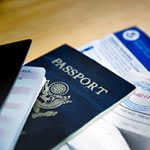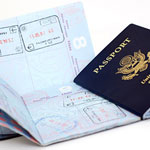Are We More Stressed Than the Rest of the World

Ask the average person how often they feel stressed out during the week and odds are they’ll tell you at least once. Many will likely answer it’s more than once. Despite recent surveys showing a decline in stress, many Americans still exhibit higher levels of stress that are not considered healthy levels. But just how do stress levels in America compare to the rest of the world?
Research has shown that the sources of stress vary from person to person. In fact, some personality types are more prone to feeling stressed than others. Still, some of the most common stressors include loss of a loved one, divorce, childhood trauma, health of children, money, job, personal health, relationships with others and physical danger.

Although some things are beyond someone’s control, there are things people can have more control over. As mentioned above, some people seem to be programed to be more stressed out than others, while those with more laid-back attitudes handle stress better. Society can also determine how often you feel stressed out. The question is, how does Americans compare to those living in other countries?
Studies suggest that between forty and fifty percent of first marriages in America end in divorce. The rate is higher for second and third marriages. Divorce and finances often play an integral role.
Different spending habits and arguments over money are a leading cause of divorce in the United States.
According to a recent study, twenty-two percent of couples who divorce do so due to arguments about money. France, Spain and Belgium all have higher divorce rates than the United States. While money matters did make the list, the most commonly named reasons for divorce in these countries included infidelity, irreconcilable differences and falling out of love.
The American Psychological Association recently conducted a survey asking participants what most stresses them out. Seventy-six percent of respondents cited money. Even with a healthier economy, Americans are still worried about their finances. With the housing market still in recovery mode and the unemployment rate still above what it was before the last big recession, Americans have learned to be more wary.
In fact, an international poll conducted by Reader’s Digest and shared by CNN cited money as the leading cause of stress worldwide. Participants were asked to choose between family, health, state of the world and money. Most people picked money. The United States ranked as the fourth most money-stressed country with Malaysia, China and Singapore taking first through third place. On the other hand, a study conducted in the UK found work to be the biggest stressor with money problems only being cited as the major cause of stress for thirty percent of those surveyed.
According to a Gallop poll, the average American work week is forty-seven hours. Eighteen percent of workers said they work sixty hours or more per week. Compare this to the 42.2 hour average put in by Greek workers who ranked the highest in Europe, and it’s easy to see why work issues are a top stressor for many Americans. Americans spend more hours at work annually than French, British and Japanese workers.
The balance between work and family can lead to major stress for many families. In the U.S., seventy percent of children have both parents at work. The U.S. is the only country that does not offer nationally paid parental leave benefits. With record numbers of mothers working in the U.S., Americans also among the most stressed out in terms of work/family balance. A 2014 Monster Worldwide Incorporated poll found that forty-two percent of Americans said stress had caused them to leave their jobs.
Vacations offer time to relax, unwind and de-stress. Without proper time to unwind, stress, anxiety and depression can quickly take over. But do Americans have the time to unwind that workers in other industrialized nations do? While time off varies among people within a country, once again Americans on average are getting less than their European counterparts. Every European Union country has four weeks of paid vacation or more for their employees required by law.
In addition, the U.S. is the only industrialized country with no legally mandated annual leave. France, on the other hand, grants workers an entire month of paid leave every year. Workers in Sweden, Denmark and Norway get a government mandated twenty-five hours per week off. So, where do American workers rank in terms of total paid days off? The answer is a mere thirteen days of paid time off. Numerous industrialized nations including Canada, Japan, Austria, Australia, Germany, France and Italy give their workers more paid days off.
Fearing for the physical safety of self and loved ones can cause high levels of stress, even chronic stress. Are Americans feeling more stressed out due to fear of physical violence than people in other countries? Countries in the middle of war and other political turmoil can’t be compared to nations not at war. So in terms of industrialized nations not directly experiencing war how does America rank?
According to a CIVITAS report the United States has the highest homicide rate of any advanced industrialized nation. In a recent Time magazine article, crime was one of the top factors determining how stressed out a city’s inhabitants were. New York, Los Angeles and Detroit, three cities with notoriously high crime rates, all made the top of the list. In general, Americans have a higher risk of becoming victims of crime than do those living in countries with lower crime indexes, such as the UK and Germany.
A Bloomburg survey done in 2013 compared the stress levels of seventy-four countries using seven different variables. With its high population, high poverty rate, and issues with government corruption, Nigeria made the top of the list with North America coming in at 54.
North American culture is very fast-paced with a lot of emphasis placed on competition and winning. While many American employees would like more paid time off and most would admit to feeling high levels of work-related stress at least once in a year, employee benefits and pay still compare well to other countries. In the end, it’s a toss-up. The level of stress one feels depends on a variety of factors, with the country you live in just being one.
You might also be interested in...
-
 6 Foods That Feed Your Brain
6 Foods That Feed Your Brain
-
 6 Things To Give Up This Year
6 Things To Give Up This Year
-
 7 Common Relationship Deal-Breakers
7 Common Relationship Deal-Breakers
-
 7 Facts Women Should Know About Heart Disease
7 Facts Women Should Know About Heart Disease
-
 When You Already Feel Like Giving Up On Your Resolutions
When You Already Feel Like Giving Up On Your Resolutions
-
 Amazing Tips To Help You Get Through Allergy Season
Amazing Tips To Help You Get Through Allergy Season
-
 Anti-Aging Tips And Tricks
Anti-Aging Tips And Tricks
-
 Are Protein Shakes A Healthy Choice?
Are Protein Shakes A Healthy Choice?
-
 Are We More Stressed Than the Rest of the World
Are We More Stressed Than the Rest of the World
-
 Are You Ruining Your Relationship
Are You Ruining Your Relationship
-
 Are You Socially Awkward?
Are You Socially Awkward?
-
 Attitude Of Gratitude
Attitude Of Gratitude
-
 Beating Work Burnout is Easier than You Think
Beating Work Burnout is Easier than You Think
-
 Benefits Of Yoga And Meditation
Benefits Of Yoga And Meditation
-
 Beware Of Relationship Killers
Beware Of Relationship Killers
-
 Big Cities Surprisingly Great for Outdoorsy People
Big Cities Surprisingly Great for Outdoorsy People
-
 How To Boost Your Self Confidence
How To Boost Your Self Confidence
-
 Can Saying You’re Sorry Save Your Life?
Can Saying You’re Sorry Save Your Life?
-
 Can White Wines Be Healthy Too
Can White Wines Be Healthy Too
-
 Changing Careers In Your 40s
Changing Careers In Your 40s
-
 Divorced, But Are You Ready To Start Dating Again?
Divorced, But Are You Ready To Start Dating Again?
-
 Do You Fight Like Other Couples?
Do You Fight Like Other Couples?
-
 When you don't have a green thumb
When you don't have a green thumb
-
 8 PreWorkout Meals To Maximize Results
8 PreWorkout Meals To Maximize Results
-
 Financial Benefits Of Co-Habitation vs Marriage
Financial Benefits Of Co-Habitation vs Marriage
-
 Financial Tips To Follow During And After Divorce
Financial Tips To Follow During And After Divorce
-
 Five Ways To Lead A Regret-Free Life
Five Ways To Lead A Regret-Free Life
-
 Why Your Friends Should Be Jealous If You’re 30-Something And Single
Why Your Friends Should Be Jealous If You’re 30-Something And Single
-
 Can A Full Moon Really Affect People?
Can A Full Moon Really Affect People?
-
 Getting a Life Insurance Quote Without Getting a Medical Exam
Getting a Life Insurance Quote Without Getting a Medical Exam
-
 Health Benefits Of Almond Milk
Health Benefits Of Almond Milk
-
 The Health Benefits Of Avocado
The Health Benefits Of Avocado
-
 Health Benefits Of Cinnamon
Health Benefits Of Cinnamon
-
 How To Choose A Multivitamin?
How To Choose A Multivitamin?
-
 How To Make The New Year The Best One Yet
How To Make The New Year The Best One Yet
-
 How To Prepare For Your Next Interview
How To Prepare For Your Next Interview
-
 Is a Co-worker Making You Hate Your Job?
Is a Co-worker Making You Hate Your Job?
-
 Is The Ketogenic Diet Safe?
Is The Ketogenic Diet Safe?
-
 Is Music The Antidote For Depression
Is Music The Antidote For Depression
-
 Is Your Diet Making You Feel More Stress?
Is Your Diet Making You Feel More Stress?
-
 How To Keep Your Facebook Safe From Scammers
How To Keep Your Facebook Safe From Scammers
-
 Life Insurance Companies Offer Protection
Life Insurance Companies Offer Protection
-
 Living With Fibromyalgia
Living With Fibromyalgia
-
 How To Look Better Than Ever At 40
How To Look Better Than Ever At 40
-
 More Big Cities Surprisingly Great for Outdoorsy People
More Big Cities Surprisingly Great for Outdoorsy People
-
 Natural Remedies For Acid Reflux
Natural Remedies For Acid Reflux
-
 No Medical Exam Life Insurance—Simple Application
No Medical Exam Life Insurance—Simple Application
-
 10 Olympic Sports That Didn’t Make the Cut
10 Olympic Sports That Didn’t Make the Cut
-
 Outrageous Facts about U.S. Presidents
Outrageous Facts about U.S. Presidents
-
 Ovarian Cancer--The Silent Killer
Ovarian Cancer--The Silent Killer
-
 Overcoming Frustration
Overcoming Frustration
-
 How To Get Relief From Credit Card Debt
How To Get Relief From Credit Card Debt
-
 Is There A Risk of Heart Disease Due To Drinking?
Is There A Risk of Heart Disease Due To Drinking?
-
 Shocking Food Facts that May Change the Way You Eat
Shocking Food Facts that May Change the Way You Eat
-
 Sick Of Running? 5 Cardio Routines You Should Try Instead
Sick Of Running? 5 Cardio Routines You Should Try Instead
-
 Smart Tips for Getting Paid What You Really Deserve
Smart Tips for Getting Paid What You Really Deserve
-
 Strange Laws You Don't Even Know You're Breaking
Strange Laws You Don't Even Know You're Breaking
-
 The Singles’ Guide To Life Insurance
The Singles’ Guide To Life Insurance
-
 Things To Remember When Buying Life Insurance
Things To Remember When Buying Life Insurance
-
 Top 5 Things You Need To Know About Life Insurance
Top 5 Things You Need To Know About Life Insurance
-
 Top 6 Factors That Destroy Your Credit Score
Top 6 Factors That Destroy Your Credit Score
-
 Top Ten Health Tips For Active Women Over 50
Top Ten Health Tips For Active Women Over 50
-
 Treating Menopause Symptoms With Alternative Medicine
Treating Menopause Symptoms With Alternative Medicine
-
 Want To Know How Your Interview Went? Think Of It Like A First Date…
Want To Know How Your Interview Went? Think Of It Like A First Date…
-
 What Every Woman Should Know About Breast Cancer
What Every Woman Should Know About Breast Cancer
-
 What Is Ruining Your Workout
What Is Ruining Your Workout
-
 What Most 30–Somethings Wish They’d Known in Their 20s
What Most 30–Somethings Wish They’d Known in Their 20s
-
 Whats Really To Blame For Your Bad Mood
Whats Really To Blame For Your Bad Mood
-
 Why You Keep Overeating and How to Stop
Why You Keep Overeating and How to Stop
-
 Why You Need To Talk About Life Insurance
Why You Need To Talk About Life Insurance
-
 You Can't Afford to Believe These Women's Health Myths
You Can't Afford to Believe These Women's Health Myths
-
 5 Plants To Keep In Your Bedroom
5 Plants To Keep In Your Bedroom
-
 Five Simple Ways To Protect Your Retirement
Five Simple Ways To Protect Your Retirement
-
 The Best Ways To Cover Gray Hair
The Best Ways To Cover Gray Hair
-
 5 Hidden Causes Of High Blood Pressure
5 Hidden Causes Of High Blood Pressure
-
 10 Steps To Get Through The Holidays Stress-Free
10 Steps To Get Through The Holidays Stress-Free
-
 5 Ways To Break A Bad Habit
5 Ways To Break A Bad Habit
-
 The 5 Benefits Of A Veterans Home Loan
The 5 Benefits Of A Veterans Home Loan
-
 Top 5 Prevention Tips For Heart Disease And Stroke
Top 5 Prevention Tips For Heart Disease And Stroke
-
 5 Surprising Facts About Low-Carb Diets
5 Surprising Facts About Low-Carb Diets
-
 7 Ways To Live A Happier Life
7 Ways To Live A Happier Life
-
 6 Tips To Be More Productive
6 Tips To Be More Productive
-
 7 Steps To Help Someone Who Is Grieving
7 Steps To Help Someone Who Is Grieving
-
 4 Reasons Why Your Diet Resolutions May Be Counterproductive
4 Reasons Why Your Diet Resolutions May Be Counterproductive
-
 Deciding On Braces After 40
Deciding On Braces After 40
-
 Why A Massage May Be Helpful For Back Pain
Why A Massage May Be Helpful For Back Pain
-
 How To Have Self-Compassion
How To Have Self-Compassion
-
 How To Stay Productive When You Don’t Feel Like it
How To Stay Productive When You Don’t Feel Like it
-
 Foods To Eat When You’re Feeling Stressed
Foods To Eat When You’re Feeling Stressed
-
 How Helping Others Can Make You Happier
How Helping Others Can Make You Happier
-
 Why You Don’t Have To Fear Fat When Dieting
Why You Don’t Have To Fear Fat When Dieting
-
 6 Things You Should Do To Live Without Regret
6 Things You Should Do To Live Without Regret
-
 How To Create Your Own Happiness
How To Create Your Own Happiness
-
 How To Get Immediate Stress Relief
How To Get Immediate Stress Relief
-
 Why It May Be Time To Make Some Changes
Why It May Be Time To Make Some Changes
-
 Why You May Want To Sleep On Your Left Side
Why You May Want To Sleep On Your Left Side
-
 4 Health Symptoms You Should Never Ignore
4 Health Symptoms You Should Never Ignore
-
 Dos And Don’ts Of Job Interviews
Dos And Don’ts Of Job Interviews
-
 How You Can Benefit From Showing A Little Love
How You Can Benefit From Showing A Little Love
-
 Can Debt Affect Your Health?
Can Debt Affect Your Health?
-
 What Women In Their 50s Know
What Women In Their 50s Know
-
 Hidden Reasons For Night Sweats
Hidden Reasons For Night Sweats
-
 5 Simple Lung Cancer Prevention Tips
5 Simple Lung Cancer Prevention Tips
-
 Why You Should Get Out Of Your Comfort Zone Now
Why You Should Get Out Of Your Comfort Zone Now
-
 7 Tips To Keep Runners Safe
7 Tips To Keep Runners Safe
-
 How To Stop Emotional Eating Now
How To Stop Emotional Eating Now
-
 Reach Your Potential In 4 Steps
Reach Your Potential In 4 Steps
-
 5 Ultimate Weight Loss Hacks
5 Ultimate Weight Loss Hacks
-
 Can Social Media Help With Weight Loss
Can Social Media Help With Weight Loss
-
 How A Good Impression Can Change Everything
How A Good Impression Can Change Everything
-
 Must-Know Travel Tips If You Want To Stay Safe
Must-Know Travel Tips If You Want To Stay Safe
-
 Three New Ways To Make Big Changes
Three New Ways To Make Big Changes
-
 The Hidden Benefits Of Ginger
The Hidden Benefits Of Ginger
-
 5 Tricks To Slim Down Fast
5 Tricks To Slim Down Fast
-
 How To Finally Wake Up Better
How To Finally Wake Up Better
-
 5 Chemical-Free Ways To Keep Skin Young
5 Chemical-Free Ways To Keep Skin Young
-
 The Secret Benefits Of Salt
The Secret Benefits Of Salt
-
 Why Be An Organ Donor?
Why Be An Organ Donor?
-
 How To Relieve Stomach Ulcers Fast
How To Relieve Stomach Ulcers Fast
-
 Disaster Relief Do’s And Don’ts
Disaster Relief Do’s And Don’ts
-
 How To Say Goodbye To A Loved One
How To Say Goodbye To A Loved One
-
 4 Tricks To Prevent A Cybercrime Attack
4 Tricks To Prevent A Cybercrime Attack
-
 The Dos And Don’ts Of Getting A Tattoo
The Dos And Don’ts Of Getting A Tattoo
-
 What To Do When Hearing Loss Strikes
What To Do When Hearing Loss Strikes
-
 How Auto Ship Programs Keep Scamming People
How Auto Ship Programs Keep Scamming People
-
 How To Decrease Stress And Increase Productivity
How To Decrease Stress And Increase Productivity
-
 Unique Relief For Chronic Neck Pain
Unique Relief For Chronic Neck Pain
-
 Ransomware–What It Is And How To Avoid Attack
Ransomware–What It Is And How To Avoid Attack
-
 Five Reasons To Drink More Tea
Five Reasons To Drink More Tea
-
 5 Major Life Events That May Require Life Insurance
5 Major Life Events That May Require Life Insurance
-
 6 Reasons Newlyweds Should Consider Life Insurance
6 Reasons Newlyweds Should Consider Life Insurance
-
 How Long Does It Take to Get a Life Insurance Policy?
How Long Does It Take to Get a Life Insurance Policy?
-
 How Long Does It Take to Get Life Insurance Money?
How Long Does It Take to Get Life Insurance Money?
-
 What You Need To Know About Mortgage Assistance Programs
What You Need To Know About Mortgage Assistance Programs
-
 How to Build a Better Resume: 7 Helpful Tips
How to Build a Better Resume: 7 Helpful Tips
-
 4 Things Women Should Do During Breast Cancer Awareness Month
4 Things Women Should Do During Breast Cancer Awareness Month
-
 10 Ways to Get More Out of Life
10 Ways to Get More Out of Life
-
 Who Owns Globe Life and Accident Insurance Company?
Who Owns Globe Life and Accident Insurance Company?
-
 Can I Buy Life Insurance Online?
Can I Buy Life Insurance Online?
-
 Cancelling My Life Insurance. What are My Options?
Cancelling My Life Insurance. What are My Options?
-
 Can Life Insurance be Purchased on Anyone by Anyone?
Can Life Insurance be Purchased on Anyone by Anyone?
-
 Understanding Insurance Claims: Complex Causes of Accidental Death
Understanding Insurance Claims: Complex Causes of Accidental Death
-
 How Can I Sell My Life Insurance Policy?
How Can I Sell My Life Insurance Policy?
-
 Checking Your Insurance Coverage Before Traveling Abroad: What to Know
Checking Your Insurance Coverage Before Traveling Abroad: What to Know
-
 Can I Convert My Term Life Insurance into a Whole Life Insurance Policy?
Can I Convert My Term Life Insurance into a Whole Life Insurance Policy?
-
 Should I Buy Enough Life Insurance to Pay Off My Mortgage?
Should I Buy Enough Life Insurance to Pay Off My Mortgage?
-
 What Is Whole Life Insurance?
What Is Whole Life Insurance?
-
 Beyond Active Duty: Life Insurance Options for US Veterans
Beyond Active Duty: Life Insurance Options for US Veterans
-
 The Risk of Having a Stroke for People Under 40
The Risk of Having a Stroke for People Under 40
-
 Is Drowning Considered an Accidental Death for Insurance Purposes?
Is Drowning Considered an Accidental Death for Insurance Purposes?
-
 How Long is a Term Life Insurance Policy?
How Long is a Term Life Insurance Policy?
-
 Tips for Choosing a Life Insurance Beneficiary
Tips for Choosing a Life Insurance Beneficiary

 Insurance products are available in New York from
Insurance products are available in New York from  Insurance products are available in your state from
Insurance products are available in your state from 





























































































































































